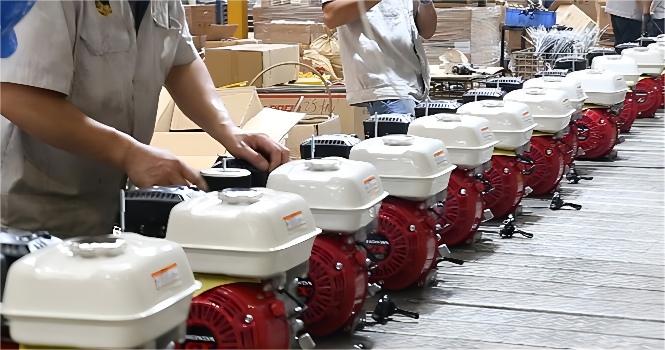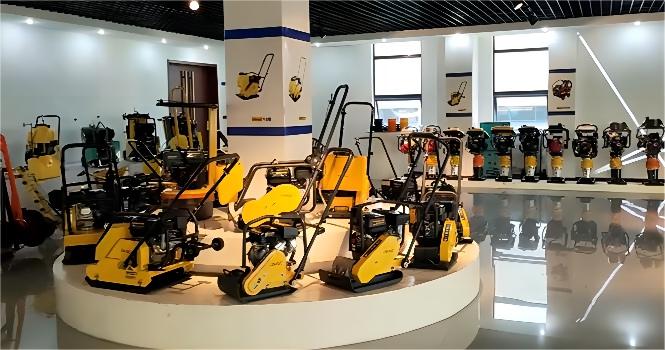Gravel Compactor PME-CY150
When you are looking for a Gravel Compactor, we can assist you in selecting the most suitable Plate Compactor for your business.
Gravel Compactor PME-CY150
The PME-CY150 Gravel Compactor is a powerful and durable compaction machine, designed for professional use in compacting gravel and other heavy-duty materials. Powered by your choice of Honda, Robin, Loncin, or Diesel engine, this versatile machine delivers exceptional performance across various construction applications.
High-Performance Compaction
With a plate size of 63 cm x 40 cm, the PME-CY150 generates a robust centrifugal force of 25 KN, allowing it to compact to a depth of up to 50 cm. Operating at a frequency of 4,350 VPM, this machine provides efficient and consistent compaction, covering an area of 480 square meters per hour. Its travel speed of 25 meters per minute ensures high productivity on large-scale projects, making it ideal for compacting gravel, sand, and soil in road construction, landscaping, and foundation work.
Versatile Application
The PME-CY150 is engineered to handle a wide range of materials, including granular and cohesive soils. Its versatility makes it a reliable choice for contractors working on pathways, driveways, and construction sites. The machine is also capable of working on sloped surfaces, with a maximum inclination angle of 20°, providing stability and effective performance on uneven terrain.
Durable Construction
Built to withstand the rigors of heavy-duty use, the PME-CY150 features high-quality materials and a sturdy design. With a net weight of 150 kg and a gross weight of 140 kg, the machine is both durable and easy to transport. The compact packaging size of 78 cm x 45 cm x 125 cm ensures convenience in storage and transportation. The PME-CY150 also comes with a 1-year product warranty, offering reliable performance and peace of mind for professionals tackling demanding compaction projects.
Applications
- Retaining Walls
- Footings and Foundation Projects
- Landscapes and hardscapes
- Patchwork on Asphalt
- Pipeline Applications
- Road Repair and Trenchwork
- Cohesive Soils and Granular Soils
- Sticky soils – such as clay or clayey silt
- Gravel, sand, silt, clay, or mixed soils
- Base, Subbase, Subgrade, Subsoil
- Backfill Pools, Parks, Cemeteries, and Golf Courses
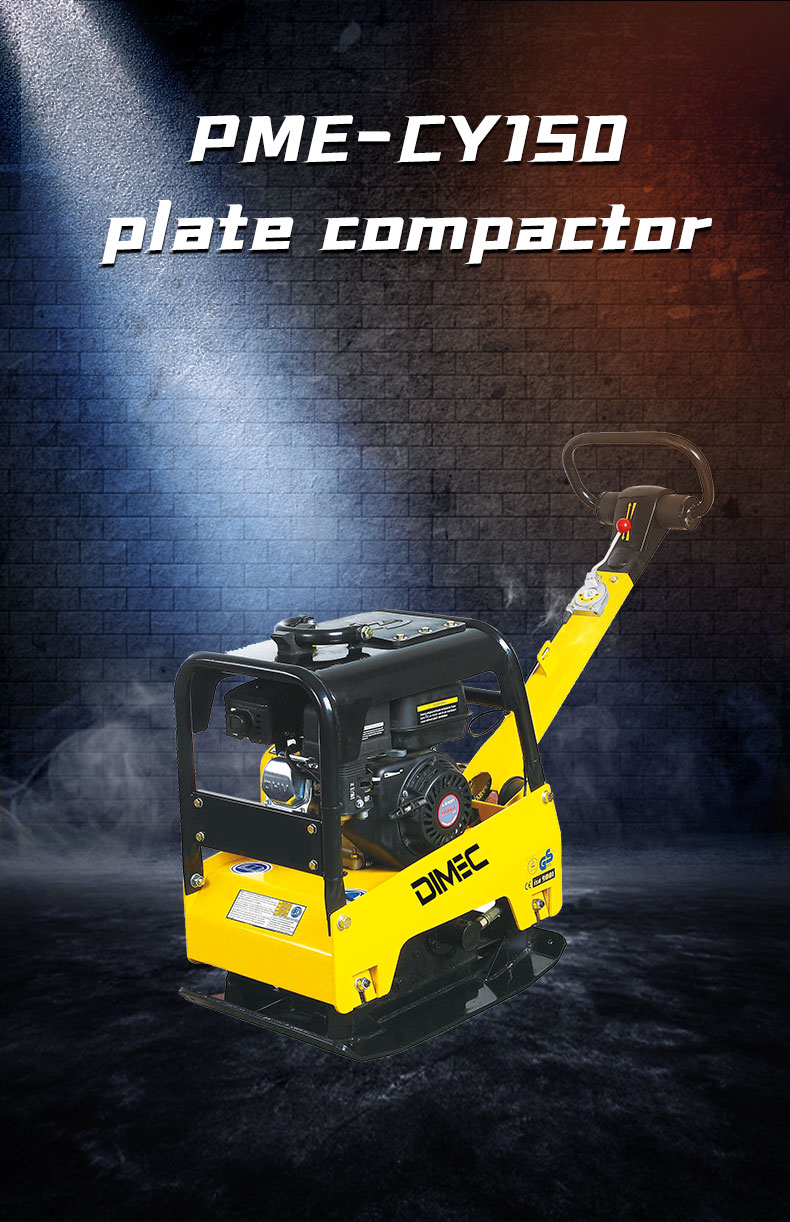
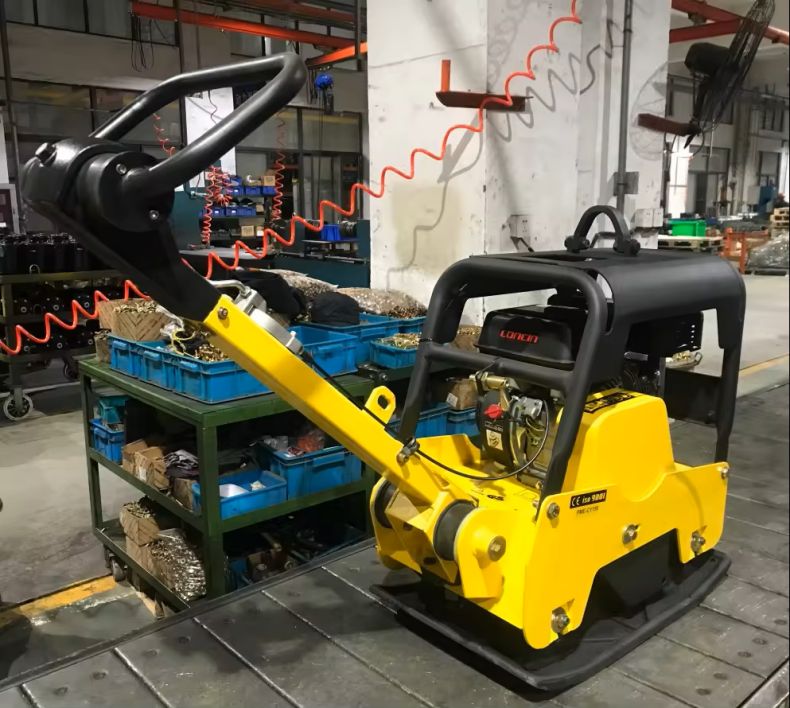
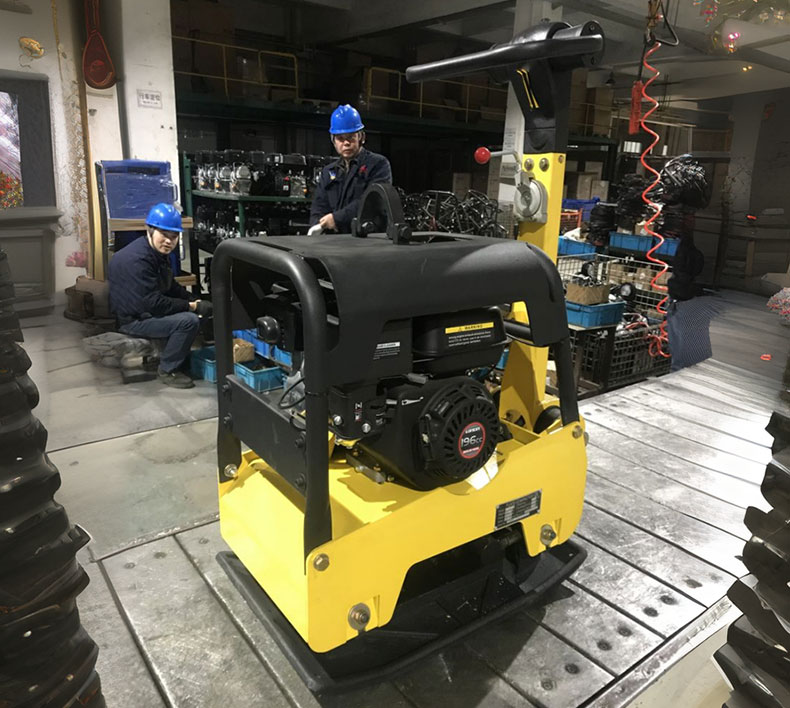
Key Specifications
| Model | Gravel Compactor PME-CY150 |
|---|---|
| Engine | Honda / Robin / Loncin / Diesel engine |
| Engine type | Air-cooled, single cylinder, 4-stroke, petrol engine / diesel engine |
| Frequency [VPM] | 4350 |
| Centrifugal force [KN] | 25 |
| Plate size (LxW) [cm] | 63x40 |
| Max.compaction depth[cm] | 50 |
| Travel speed [m/min] | 25 |
| Max.inclination angle | 20° |
| N.W./G.W. [kg] | 140/150 |
| Package (LxWxH) [cm] | 78x45x125 |
ADVANTAGE

Low vibration comfortable operation
Heavy-duty shock absorber system that effectively improves operating comfort by reducing shock to arms.
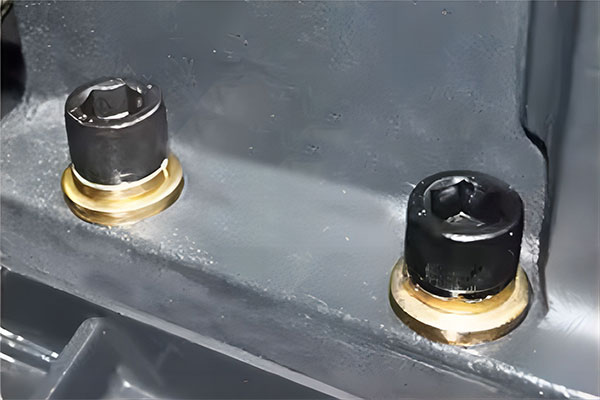
12.9 Grade bolts
High-strength bolts with exceptional durability, providing reliable fastening even under intense pressure and demanding conditions.

High strength engine frame
The material of thickened steel pipe has strong supporting force and stable gravity bearing capacity.

Strong power brand engine
Well-know brand engines Honda, Robin, Loncin low noise, low maintenance, low consumption.
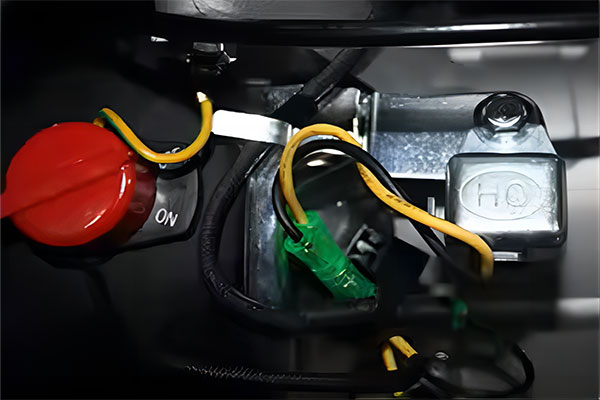
Low oil sensor
Advanced low oil sensor technology ensures automatic engine protection by preventing operation when oil levels are insufficient, extending engine life.
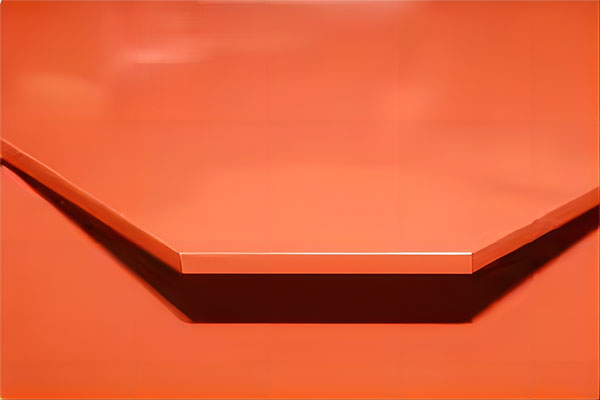
Professional spraying process
Utilizes advanced spraying techniques to deliver a smooth, even coating that resists wear, corrosion, and fading, ensuring long-lasting protection and aesthetic appeal.
QUESTIONS & ANSWERS
The primary function of a gravel compactor is to compress and consolidate gravel and other materials to create a firm and stable base. This is essential for construction projects such as roads, foundations, and landscaping, as it ensures that the surface remains level and durable over time.
For most gravel compaction projects, a vibratory plate compactor is the best option. It is well-suited for granular materials like gravel and provides the right combination of weight and vibration to compact the material effectively.
Most plate compactors can effectively compact gravel up to a depth of 6 to 8 inches per layer. For deeper compaction, the material should be added and compacted in layers to ensure even density throughout.
Using a compactor on wet gravel can be challenging because excess water can make the material too soft and difficult to compact properly. It's generally best to allow the gravel to dry out before compacting, although lightly moist gravel can sometimes help reduce dust and aid in compaction.
To maintain a gravel compactor, regularly check the oil levels, air filter, and engine components. After each use, clean the machine to remove any dirt or debris, and store it in a dry location. Following the manufacturer’s recommended maintenance schedule will also help prolong the machine’s lifespan.
Other Similar Products
20+ Years of Experience
Construction Machine Manufacturer
Professional manufacturer of small construction machinery, main products include plate compactor, tamping rammer, road roller,floor saw, concrete vibrator, generator etc.
Hydraulic Reversible Plate Compactor
The Hydraulic Reversible Plate Compactor is a vital tool for construction and landscaping, designed for effective soil compaction in various environments. Its advanced hydraulic system allows for seamless forward and reverse operation, making it ideal for compacting asphalt and granular soils. With high-frequency vibrations, this compactor efficiently densifies materials, ensuring a solid foundation for roads, patios, and driveways.
This machine excels in tight spaces where traditional compactors may struggle, thanks to its lightweight design and powerful compaction force. Adjustable speed settings provide tailored performance to meet specific project needs, enhancing productivity.
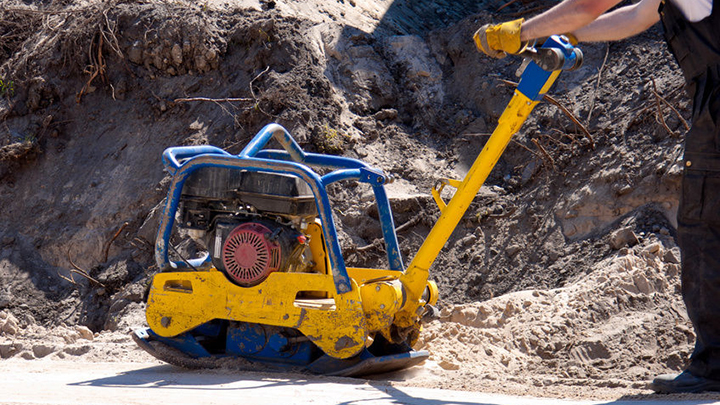
Gravel Compactor: The Essential Guide for Optimal Ground Preparation
Gravel compactors are a must-have tool for construction and landscaping projects that require stable and even ground. They provide the force and vibration necessary to compact gravel and soil, creating a firm base for pathways, roads, and building foundations. In this guide, we will delve into everything you need to know about gravel compactors, from how they work to how to choose the right model for your project.
What is a Gravel Compactor?
Definition and Functionality
A gravel compactor is a machine designed to compress and consolidate gravel and soil to create a firm, stable surface. It is commonly used in construction projects such as building roads, laying foundations, or installing driveways and patios. The compacting process increases the density of the material, ensuring that it can withstand weight and movement without shifting.
Gravel compactors are particularly useful for projects involving loose aggregates like gravel because they provide the necessary force to eliminate air pockets and create a solid base. This ensures longevity and durability for any structure built on top of the compacted ground.
Types of Gravel Compactors
There are several types of gravel compactors, each suited for different kinds of projects and materials. The most common types include plate compactors, jumping jack compactors, and roller compactors, each with its own strengths and ideal applications.
How Does a Gravel Compactor Work?
The Mechanics of Compaction
Gravel compactors work by using a combination of weight, vibration, and impact to push down and compress the material beneath them. The machine’s heavy base or plate presses against the ground, while its vibratory mechanism creates rapid, powerful movements that drive the particles closer together.
The process of compaction removes excess air and moisture from the gravel, reducing the chances of shifting or settling over time. It also creates a more uniform surface, which is essential for construction projects that require even foundations.
Importance of Vibration and Force
The vibratory mechanism is crucial in gravel compactors because it helps distribute force evenly across the surface. Without vibration, the machine might not be able to achieve the deep, even compaction necessary for a stable base. Higher-end models often offer adjustable vibration settings, allowing operators to customize the compaction force based on the type of material they’re working with.
Benefits of Using a Gravel Compactor
Enhanced Stability
One of the primary benefits of using a gravel compactor is the increased stability it provides to any structure built on compacted ground. Whether it’s a simple garden path or a large-scale commercial building, compacting the gravel ensures a solid foundation that won’t shift or settle unevenly over time.
Time and Labor Efficiency
Gravel compactors can save both time and labor on construction projects. Without them, compacting material manually would be a slow, labor-intensive process. By using a machine, large areas can be compacted in a fraction of the time, allowing projects to progress faster.
Types of Gravel Compactors
Plate Compactors
Plate compactors are among the most commonly used gravel compactors, ideal for smaller to medium-sized projects like driveways, patios, or walkways. They feature a flat, heavy base plate that vibrates as the machine moves, applying downward pressure to compact the gravel or soil beneath it.
Ideal Applications for Plate Compactors
Plate compactors are best suited for granular soils like sand, gravel, and crushed stone. These machines work exceptionally well for compacting shallow layers, usually up to 6-8 inches deep. They are perfect for DIY projects around the home and smaller commercial jobs where tight spaces or maneuverability is crucial.
How to Use a Plate Compactor
Operating a plate compactor is straightforward. The machine is typically powered by a gasoline engine, which drives the vibration plate. The user walks behind the machine, guiding it slowly over the surface that needs compacting. For best results, the operator should overlap each pass by about 30%, ensuring even compaction across the entire area.
Some models have water tanks that sprinkle water on the surface as you compact, reducing dust and enhancing the binding of fine particles in the gravel.
Jumping Jack Compactors: Pros and Cons
Jumping jack compactors, also known as rammers, are more specialized and are designed for compacting cohesive soils like clay, where a plate compactor may not be as effective. Unlike plate compactors, jumping jack compactors use a much smaller foot and a pounding action to compact material with greater force.
Best Projects for Jumping Jack Compactors
Jumping jack compactors excel in trenches or other confined spaces where tight, aggressive compaction is necessary. They are often used for road repair, utility work, or deep excavation sites where precise compaction is needed to prevent soil movement.
Limitations of Jumping Jack Compactors
While jumping jack compactors provide excellent compaction for certain soils, they aren’t as versatile as plate compactors. Their narrow footprint makes them less effective for larger, open areas, and the more aggressive compaction can damage materials like gravel, making them less ideal for projects involving loose aggregates.
Roller Compactors: When and Why to Use
Roller compactors are often used for larger, heavy-duty applications, such as compacting road bases or large foundations. They apply static pressure or vibration through large, cylindrical drums. The weight of the roller, combined with its movement, compacts the gravel or soil over a wide area at once.
Smooth Drum vs. Padfoot Drum Compactors
There are two main types of roller compactors: smooth drum and padfoot drum. Smooth drum compactors are ideal for compacting gravel, asphalt, and other non-cohesive materials. In contrast, padfoot rollers have raised pads on the drum that help them compact cohesive materials like clay.
Key Advantages of Roller Compactors
Roller compactors are highly effective for large-scale projects where deep and uniform compaction is required. They cover more area than plate or jumping jack compactors, reducing the time needed to complete large jobs. Additionally, roller compactors can be operated over multiple passes, ensuring the material is compacted thoroughly.
Gravel Compactor Specifications
Understanding Plate Size and Weight
When choosing a gravel compactor, one of the most important specifications to consider is the plate size and weight. A larger, heavier plate can exert more force, compacting material more effectively. For example, a 100-150 kg plate compactor is ideal for most residential projects, while heavier models are used in commercial applications.
Vibration Frequency and Compaction Force
The vibration frequency, measured in Hertz (Hz), and compaction force, measured in kiloNewtons (kN), are critical factors in a compactor’s performance. Machines with higher vibration frequencies can compact more efficiently, especially for granular materials. For gravel, you want a model that offers at least 5,000 vibrations per minute and a compaction force between 15-20 kN.
How to Choose the Right Gravel Compactor
Project Requirements
Before selecting a gravel compactor, it’s essential to assess the specific needs of your project. For smaller jobs, like laying a garden path, a plate compactor is likely sufficient. However, for larger, commercial projects that require deep compaction, a roller compactor might be a better fit.
Soil and Gravel Types
The type of material you’re working with also plays a role in determining the best compactor. For example, loose, granular soils like gravel and sand are best compacted with a vibratory plate compactor, while clay or cohesive soils require more aggressive compaction, such as that provided by a jumping jack compactor.
Available Power Sources
Gravel compactors come in various power options, including gasoline, diesel, and electric models. Gasoline-powered models are common and versatile, suitable for outdoor jobs where an electrical outlet may not be available. However, electric models are ideal for indoor or confined spaces due to their lower emissions and quieter operation.
Maintenance of a Gravel Compactor
Cleaning and Storage
To prolong the lifespan of your gravel compactor, it’s essential to clean it after each use. Remove any dirt, debris, or gravel stuck to the base plate, and check for any signs of wear or damage. Store the compactor in a dry, secure location to protect it from the elements.
Routine Maintenance and Servicing
Regular maintenance includes checking the oil levels, air filter, and vibratory mechanism. Ensure all bolts and nuts are tightened securely, and replace any worn parts as needed. Most manufacturers recommend servicing the machine after every 100 hours of operation.
Common Issues with Gravel Compactors
Overheating
Overheating is a common issue with compactors, especially when used for extended periods. If the engine begins to overheat, allow the machine to cool down before resuming operation. Make sure to check the oil levels and ensure the air filter is clean.
Engine and Vibratory Mechanism Failures
Issues with the engine or vibratory mechanism can occur if the machine isn’t properly maintained. If you notice reduced compaction force or unusual noises, inspect the machine for loose components or worn parts, and consult the manufacturer’s manual for troubleshooting.
Renting vs. Buying a Gravel Compactor
Cost-Benefit Analysis
One of the first decisions when considering a gravel compactor is whether to rent or buy the equipment. For short-term or one-off projects, renting a compactor can be a more cost-effective option. Rentals typically range from $50 to $150 per day, depending on the type and size of the compactor. However, if you anticipate multiple future projects or have a long-term need for a compactor, buying might be the smarter financial move. Purchasing a gravel compactor can range from $500 to over $5,000, depending on the model and specifications.
When making the decision, it’s important to consider the frequency of use, the type of projects, and the potential maintenance costs if you opt to own the equipment.
When Renting Makes More Sense
Renting is ideal for DIY enthusiasts or contractors who need the machine for specific, short-duration projects. Additionally, renting allows you to test different types of compactors to find the one that works best for your needs without committing to a large upfront purchase. Renting also includes the benefit of not worrying about long-term storage or maintenance costs.
On the other hand, if you’re a contractor working on multiple projects throughout the year, investing in a high-quality compactor will likely pay off in the long run. Ownership offers the advantage of having the machine readily available whenever needed.
Gravel Compactors for DIY Projects
Compacting Small Areas
For smaller residential projects, like creating a backyard patio, leveling the ground for a shed, or compacting a gravel driveway, a plate compactor is often the best tool. These compactors are easy to operate and offer enough power to provide firm, stable surfaces for small to medium projects.
Before starting a DIY compaction project, it’s essential to prepare the ground by ensuring it’s free of debris and properly leveled. Compacting in layers, no more than 4 to 6 inches at a time, will yield the best results. Over-compaction should be avoided, as it can lead to surface cracking.
Tips for Residential Use
For DIYers, here are some key tips when using a gravel compactor at home:
Start with a Solid Base: Whether laying gravel for a driveway or creating a patio, the base material must be well-compacted. Begin with the subgrade (usually compacted soil) and add layers of gravel or aggregate, compacting after each layer.
Work in Passes: Like mowing the lawn, compactors work best when guided in overlapping passes. This ensures that all areas are evenly compacted and no spots are missed.
Control Dust: If working with dry gravel, it may create dust clouds. Lightly sprinkling the surface with water before compacting can help control the dust and improve the compaction quality.
Check Your Work: After a few passes, walk over the compacted surface. If it feels soft or spongy underfoot, the material may require additional passes to achieve the desired firmness.
Environmental Impact of Gravel Compaction
Noise and Vibration Considerations
While gravel compactors are highly efficient, they can also create significant noise and vibration, which may have environmental and community impacts. Most compactors generate noise levels between 85 and 100 decibels, which can be harmful to both operators and people nearby without proper hearing protection. It’s recommended to wear ear protection and consider the impact on residential neighborhoods or noise-sensitive areas when operating the machine.
Vibration can also affect nearby structures, especially older buildings, or underground utilities. For large-scale projects, it may be necessary to conduct a vibration impact assessment to ensure no damage will be caused to surrounding properties.
Eco-Friendly Alternatives
Some modern compactors are designed with eco-friendliness in mind. Electric compactors, for example, produce zero emissions and are much quieter than gasoline or diesel-powered models, making them a great choice for indoor projects or work in urban areas. Additionally, manufacturers are working on developing more fuel-efficient models that reduce carbon emissions and minimize environmental impact.
Conclusion
Gravel compactors play a critical role in ensuring that construction and landscaping projects are built on solid, stable ground. By choosing the right compactor for your needs—whether it’s a plate, jumping jack, or roller compactor—you can save time, reduce labor, and improve the overall quality of your project. Understanding how these machines work, their benefits, and the various models available will allow you to make an informed decision, ensuring that your compaction work is both effective and efficient.
Whether you’re a DIYer tackling a backyard project or a contractor working on large-scale construction, investing in the right gravel compactor is essential for achieving long-lasting results. With continuous advancements in compactor technology, these machines are becoming more efficient, environmentally friendly, and easier to use, making them a must-have tool for anyone involved in ground preparation.
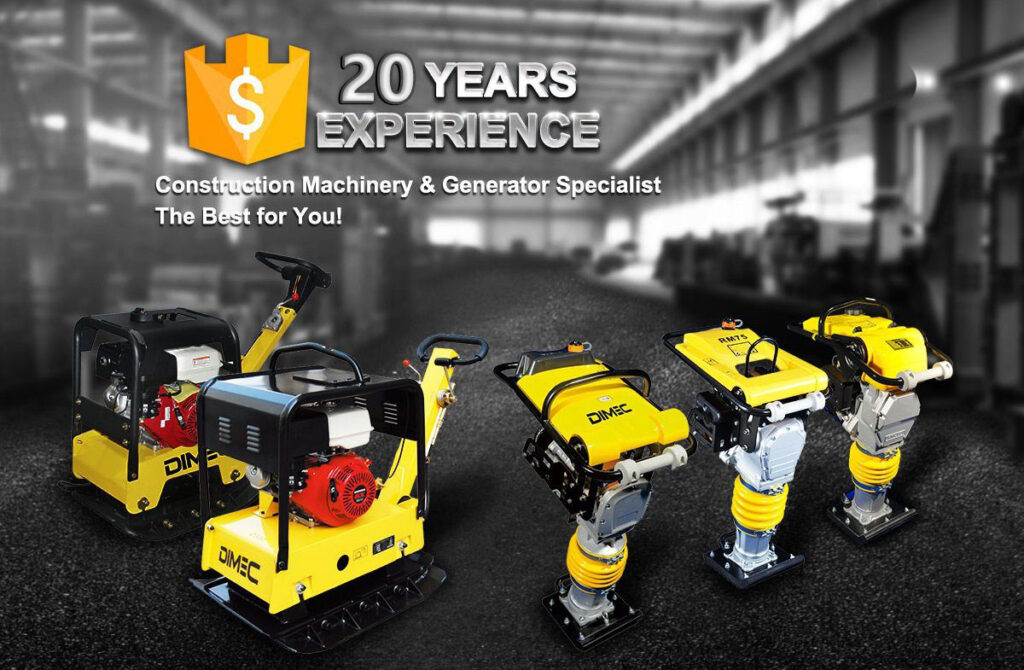
About Us
Wuxi Pinnacle Mechanical Equipment Co., Ltd. (PME) As a first-class specialty enterprise we serve global clients. PME specialize on production of plate compactor, tamping rammer, floor saw, concrete vibrator for global construction industry. We also produce engine, generator, and water pump. PME’s strengths are rooted from our strong team and rich resources.
We have complete production and assembly lines for different machines. There is a team of chief engineers, senior technicians and QC inspectors, equipped with a variety of finishing, spare parts inspection and product testing equipment, to safeguard production and innovation. Thus, we can control every step of production, from finish machining of spare parts, steel plate cutting and welding, spraying paint, all the way to product assembly. This results in effective product quality control.
With more than 20 years of exporting experience, PME has been exporting to over 68 countries and regions including North America, South America, Europe, Southeast Asia, Middle East, Africa. We also form strategic corporations with many multinational companies.
Factory Show
Let our expertise in custom Forward Plate Compactor take your projects to the next level.
Why Choose Us
Professional construction machinery manufacturer with OEM service
We are a leading manufacturer in the construction machinery industry, offering top-notch Original Equipment Manufacturer (OEM) services. Our commitment to innovation and precision engineering ensures that our machinery meets the specific needs of our clients, providing customized solutions that enhance efficiency and performance on the job site.
20 years production and exportation experience
With two decades of experience in production and exportation, we have built a strong reputation for delivering reliable and high-quality construction equipment worldwide. Our extensive knowledge and expertise in the industry enable us to understand the unique challenges of different markets, ensuring our products are tailored to meet global standards.
20+ types of construction site equipment are available for selection
We offer a diverse range of over 20 types of construction site equipment, catering to various industry needs. From heavy-duty machinery to specialized tools, our product lineup is designed to support every phase of construction, providing our clients with the flexibility to choose the right equipment for their projects.
10+ years QC monitor products quality
Our rigorous quality control processes have been refined over more than 10 years, ensuring that every piece of equipment we produce meets the highest standards. Our dedicated QC team meticulously monitors every stage of production, guaranteeing that our products deliver consistent performance and durability in the field.
8+ years experienced skilled workers
Our team comprises highly skilled workers with over 8 years of experience in the construction machinery industry. Their expertise and dedication are reflected in the precision and craftsmanship of our products, ensuring that every detail is executed to perfection.
8 workshops, 12 production lines
With 8 state-of-the-art workshops and 12 production lines, our manufacturing capabilities are designed to meet large-scale demands efficiently. Our advanced facilities allow us to maintain a streamlined production process, ensuring timely delivery of high-quality machinery to our clients around the world.
Unlock Superior Construction Efficiency with Our Expertly Engineered Machinery
Discover a world of advanced construction equipment tailored to meet the demands of modern job sites. With 20 years of industry experience and a commitment to quality, our machinery is designed to boost productivity and ensure reliability in every project. Explore our diverse range and experience the difference of precision-engineered solutions.




